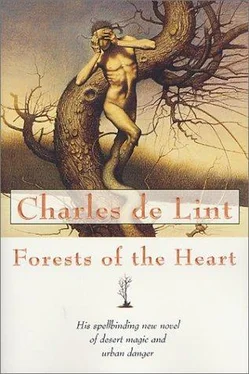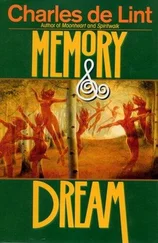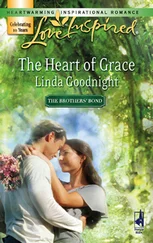“Oh, Donal,” she said.
“What is it? What’s the matter?”
She pointed at the painting. “That’s the dying Summer King.”
A feeling went pinpricking up Hunter’s spine as she spoke. For a moment he found himself thinking of the hard men, of deep woods and the smell of cigarette smoke and wolves, of a sullen anger that ran so deep and wild that he could barely comprehend its surface, never mind empathize with its depth. Then the sensation faded.
He blinked and regarded the canvas again, trying to recapture what he’d just felt, but the immediacy was gone, leaving in its wake only a pale, ragged memory.
“The Summer King?” he asked.
Miki nodded. “Just look at the way he hangs there, a last gleam of goodness and light before the end of things.”
“What do you mean? The end of what things?”
“The summer. The way we are… who we are…”
Hunter regarded her, confused by the depth of her concern.
“But it’s just a painting,” he said.
“For now,” Miki said, her voice so soft he was unsure he’d heard her correctly until she said it again. “For now.”
“Miki, what’s so upsetting about—?”
But she didn’t want to talk about it. Taking his arm, she steered him out of the room, firmly closing the door behind them. She gave him a bright smile.
“So,” she said. “What was that you were saying earlier about dinner at the Dear Mouse Diner?”
Hunter wanted to know what it was about the painting that had so shaken her, but knew he had to let it go for now. Miki could be one of the most stubborn people he knew when she put her mind to it. When she was in headstrong mode, you might as well try arguing with a stone. So he let her change the subject, let her change the mood, and tried to go along with it. But where in the past few days an out-of-place sexual tension had lain uncomfortably between them, now there was something darker. Hunter had no idea what it was. All he knew was that he liked it even less.
Tommy Raven woke from a deep sleep to find his Aunt Sunday sitting patiently on the end of his bed, waiting for him to wake up. He got the sense that she’d been sitting there for hours. Knowing her, she probably had.
Like her sixteen sisters, Sunday Creek was a tall, big-boned woman with a broad, serene face and long crow-black hair, tamed today into a pair of braids that hung halfway to her waist. She was dressed for practicality rather than fashion: jeans, flannel shirt, a beaded deerskin vest. Had it been anyone else, Tommy would have wondered how she’d been able to get into his apartment and sit down here on his bed without waking him, but he’d spent the first fourteen years of his life growing up in a household that contained his mother and her sisters, and nothing they did or said surprised him anymore.
“Did I wake you?” she asked.
Her voice held the proper measure of concern, but laughter flickered in her dark eyes.
“I wasn’t really sleeping,” Tommy told her.
“Oh?”
“No, I was composing limericks. This one’s for you: ‘There once was an aunt of the cloth’—that’s you, of course. A play on your name.”
“Very clever.”
“ ‘Who never was known to cough. Till one day a biscuit, got caught in her brisket, and the hack nearly took her head off.’ ”
“Brisket?”
“I needed the rhyme.”
“You’d have been better off sleeping.”
“That bad?”
“Worse. Do you have any tea?”
“Ah.”
Tommy wasn’t exactly a homebody. He lived off his welfare check, not because he was too lazy to hold down a regular nine-to-five, but because a regular job wouldn’t let him do what he considered his real work. Welfare paid for his apartment, the meals he ate in diners and fast-food joints, gas for his pickup, but little else. Happily, the life he’d chosen didn’t require much else. His apartment was utilitarian—though perhaps apartment was a misnomer. There was one small room that served as a combination bedroom and living area, furnished with a sofa bed that had only once been made up into a sofa since he’d moved in, and a wooden fruit crate turned on its side that held a selection of paperback books missing their front covers that he replenished as needed from the trash behind one of the bookstores on Williamson Street. There was a closet of a kitchen which he rarely used. There was an even smaller closet of a bathroom with a claustrophobic shower stall, a toilet, and sink crammed into the remaining space.
But he didn’t need anything else. He’d made a promise to the Creator when Angel got him into detox the last time: Let me live through this and I’ll dedicate my life to Beauty. That everyone had food in their stomach, shelter, knew a few words of kindness—that was his definition of Beauty. He believed in following what David Monogye, the elder of another tribe, had called humankind’s original instructions.
“The original instructions of the Creator are universal and valid for all time,” Monogye wrote in a letter to the United Nations. “The essence of these instructions is compassion for all life and love for all creation. We must realize that we do not live in a world of dead matter, but in a universe of living spirit. Let us open our eyes to the sacredness of Mother Earth, or our eyes will be opened for us.”
When one considered the world in such light, Tommy thought, what need was there for personal property or a hierarchy of worthiness for those with whom he shared the Creator’s gift of life? His only luxury was a pickup truck that his mother had given to him when he last got out of detox, and he only used it to get back and forth from the rez.
“There’s no tea,” he told his aunt. “Not much of anything, really.”
“How about a kettle?” she asked.
He shrugged. “I’ve got a pot that holds water—and the left burner on the hot plate works. At least it did the last time I used it.”
“Which was probably a month ago.”
“Two weeks, actually. I had a hot date so I went all out and splurged on some gourmet TV dinners. We dined by moonlight.”
His aunt’s eyebrows rose.
“Okay. I was reheating a take-out soup.”
Sunday reached into the pocket of her shirt and pulled out a pair of tea bags. All his life Tommy’s aunts had had this ability to pull a needed thing from their pocket. Candy, gum, a smudgestick, herbs, channs.
“I’ll go put the water on,” she said. “Do you take your tea black?”
Tommy grinned. “Today I do.”
She shook her head and got up from the bed.
“Get dressed,” she told him. “We need to talk.”
He waited until she’d stepped into the kitchen, then flung back his blanket. His clothes hung from the arm of the sofa bed. It only took him a few moments to put on jeans, T-shirt, a checked flannel shirt. Straightening the blankets on his bed, he went to stand in the doorway where he watched his aunt rinse out a couple of mugs. They hadn’t been dirty, simply dusty from disuse.
“Aunt Sunday,” he said after a moment. “Why are you here?”
“We’re worried about you.”
He didn’t have to ask who she meant. “We” would encompass Sunday herself, his mother, and their fifteen other sisters, his aunts. He wondered, not for the first time, what it would have been like to have grown up in that household when they were young, all those gangly girls with their broad, happy faces; a pack of rambunctious and fey tomboys, by all accounts, running wild through the rez, touched by Mystery and Beauty. But they’d been grown women by the time he was born—the unhappy reminder of his mother’s bad marriage, though no one ever said it in so many words.
“I chose this life,” he told her. “I know I’ve never amounted to much, but what I’m doing now is a lot better than lying drunk in some alley.”
Читать дальше












